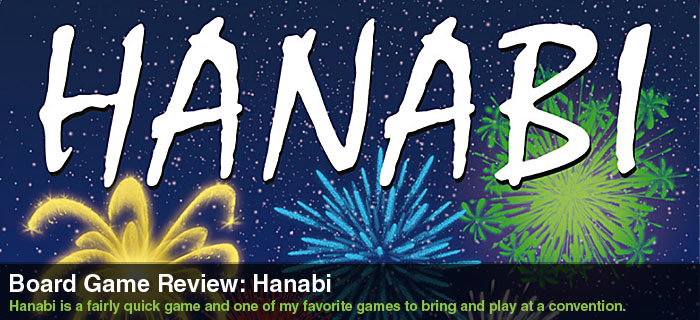 Every year, thousands of Americans spend hundreds of dollars on fireworks for the Fourth of July. This year, I’ll be getting some extra value out of a $10.95 firework investment I made about a year ago. Why am I talking about fireworks on a gaming site? Well, that’s easy, I’m talking about the firework-themed 2013 Spiel des Jahres winner for 'Game of the Year,' Antoine Bauza's Hanabi!
Every year, thousands of Americans spend hundreds of dollars on fireworks for the Fourth of July. This year, I’ll be getting some extra value out of a $10.95 firework investment I made about a year ago. Why am I talking about fireworks on a gaming site? Well, that’s easy, I’m talking about the firework-themed 2013 Spiel des Jahres winner for 'Game of the Year,' Antoine Bauza's Hanabi!
Hanabi is a cooperative card game for 2 - 5 people, in which players work together to create a beautiful fireworks display; this is performed by playing different colors of cards in numerical order, ranging from 1 - 5 for each of the five colors in the game--there are three 1’s, two 2’s, two 3’s, two 4’s, and only one 5 in each of the various colors, and you can work on completing each display simultaneously. Once the fifth card is played, the fireworks in that color are successfully launched. Play a card out of numerical order and the fuse gets closer to exploding--you only get three mistakes before this happens, so be careful. Hopefully this doesn't sound too easy because, the catch is, you won’t be able to see the cards in your hand.
So how do you know which cards to play and when? Working with your teammate(s), you must give each other clues about the cards each other holds. On your turn you have three options: you can give a clue if a clue token is available, play a card, or discard a card to get one clue token back. To give a clue on your turn, simply flip one of the eight clue tokens and tell one of the other players if they have a certain color or number in their hand, but not both. You must also give complete information, so, if they have a red 1 and a blue 1, you must point to the two cards in question and say, “These two cards are 1’s.”
The game will end in one of three ways: either you’ll triumphantly launch all the fireworks, let the fuse explode, or, if the deck runs out, everyone gets one final turn to successfully launch all the fireworks.
Arguably, the hardest part of the game is trying not to accidentally cheat, or figuring out what actually defines cheating in the game; it’s very easy to give additional information with facial expressions or how you say the clues--I've even caught myself forgetting to give complete information when giving a clue. Worse yet, accidentally cheating gets easier to do the more you play with the same group; suddenly, the way in which you word a clue is a clue unto itself. Often, my friends and I have joked that the purest way to play Hanabi would be through Skype, only showing the cards and typing the clues.
Hanabi is a fairly quick game, lasting around 30 minutes, and it’s one of my favorite games to bring and play at a convention and even more entertaining around 3:00am! (Yes! I’m going to make 3:00am Hanabi a thing!) So, if you’re looking for a simple card game to play with family and friends and don’t mind being a little relaxed with the rules, you can’t do much better than Hanabi.
- # of players: 2 - 5
- Play time: 20 - 30 minutes
Hanabi (R&R Games)
